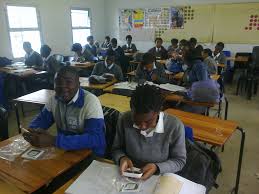It doesn’t matter whether it’s the First Industrial Revolution or the Fourth, being properly taught the 3 Rs is crucial.
From 1994 until now, the ANC has been promising us “Jobs! Jobs! Jobs!”, and then has proceeded to destroy jobs with ruinous policies and laws. We now have record unemployment, with over 35% of people of working age without jobs (including those who have given up looking for work) and over half of young people of working age without jobs. Nothing in the many political speeches on Youth Day (16 June) or in President Ramaphosa’s State of the Nation Address (20 June) offers the slightest prospect of reduced unemployment. On the contrary, the ANC’s avowed policies of ever more restrictive labour laws, the minimum wage, ever more craven surrender to the trade unions, more and more red tape, more racial engineering and BEE, along with a deep hatred of business and capitalism, will simply make unemployment worse. When Ramaphosa promised “two million jobs for young people within the next decade” you could almost hear the groan of derision from the suffering public.
The latest vogue phrase is “The Fourth Industrial Revolution”. (The accompanying jargon is “STEM” – Science Technology Engineering and Mathematics.) Perhaps because it sounds vaguely prophetic and mysterious, this silly phrase seems to be hypnotising politicians and journalists today, and promising either doom by mass unemployment or utopia with vast new possibilities in economics, technology and leisure. Actually all it means is acceleration in a trend that has been happening for over a century, the replacement of human bodies and brains with machines. The electronic revolution, without parallel in history, provided the acceleration. It replaced the radio valve with the transistor, which could be made tiny and could be produced quickly, cheaply and in staggering numbers on special printed circuits (“chips”).
Up to now, when machines replaced men, there was a massive increase in employment. One machine did the job of 100 men, and changed the economy to give work to 1000 men. The Industrial Revolution in Britain (“The First Industrial Revolution”) is the classic instance. Steam engines and textile machines displaced human labour (hard, horrible human labour) and opened up vast new possibilities for more interesting and easier human labour elsewhere. If history repeats itself – by no means certain and inevitable – the same will happen with the Fourth Revolution.
Often, improving technology reduces the need for skills. In the Middle Ages, the deadliest weapon in Europe was the Longbow. With it a skilled archer could kill a man at over 100 metres. “Skilled” is the key word. The English and Welsh archers who won the crushing victories at the battles of Crecy and Agincourt needed 10 years of training. Today a schoolgirl with a modern rifle could do the same with 10 minutes of training. In my brief career in the textile industry, I have seen modern electronically-controlled machines removing the need for skills, so that any intelligent man or woman could operate them with a few months of training. The Fourth Industrial Revolution will almost certainly offer huge numbers of jobs for people with a decent education in the most basic requirements for skills and knowledge: reading, writing and arithmetic.
That is all school children today need for the Fourth Industrial Revolution. The specific skills for each discipline and job will be provided at the workplace or in specialist schools, including training in computer programming in its various and changing languages. The required skills will change quickly with time and so workers will have to be versatile and able to learn new things throughout life. The only preparation they need from schooldays is in the basics: school leavers must be completely literate and have a good grasp of simple mathematics and arithmetic; they must be able to think for themselves and to convey their thoughts to others, in writing or speech. Ramaphosa expressed the right hope when he said “every 10 year old will be able to read for meaning”.
The trouble is that most of our black 10 year olds cannot “read for meaning”. In our disastrous education system, school leavers do not have the basic skills of reading, writing and arithmetic. The reasons are well known, and neither Ramaphosa nor any other ANC politician will admit to them, let alone remedy them. The biggest problem is SADTU (SA Democratic Teachers Union). It is wrecking black education. The ANC is well aware of this and so are the SADTU bosses, which is why they all send their own children to Model C or private schools. But SADTU is powerful politically and controls most of the Education Department. That is why Ramaphosa and the rest of the ANC will never act against it. And that is why our poor, black children are doomed to lives of unemployment and destitution. The refusal by Ramaphosa to acknowledge this makes a mockery of all his pronouncements of improved education, and of his hope about the Fourth Industrial Revolution, and so of all the prospects for better South African lives.
Andrew Kenny is a writer, engineer and classical liberal.
The views of the writer are not necessarily the views of the IRR.
If you like what you have just read, become a Friend of the IRR if you aren’t already one by SMSing your name to 32823 or clicking here. Each SMS costs R1.’ Terms & Conditions Apply.

